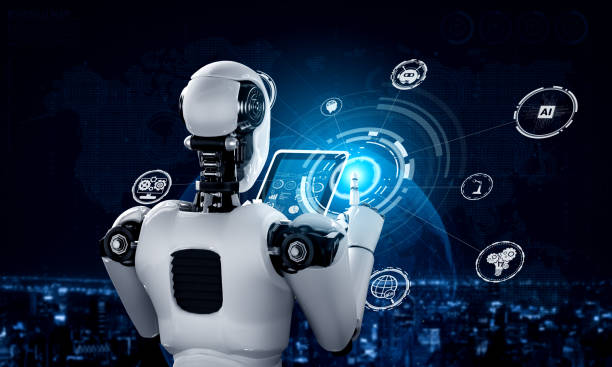Artificial Intelligence (AI) has become an enthralling force that is changing industries and opening up new opportunities for business growth. In today’s highly competitive marketplace, enterprise decision-makers must be aware and use the potential to harness the power of Artificial Intelligence to boost human productivity and sustain success.
With the help of AI technology, companies can improve workflows, streamline their operations and empower their employees by providing actionable information. This article delved deeper into how business leaders can leverage AI’s power to increase human productivity with valuable examples and data that show the technology’s immense impact.
Making use of AI and ChatGPT to generate AI and ChatGPT
AI tools, such as generative AI models and conversational agents like ChatGPT, have widened the scope of AI in transforming the productivity of humans. A study found that using generative AI to create content led to a 40 percent decrease in time spent creating product descriptions, allowing employees to concentrate on more important tasks. In addition, a recent survey revealed that companies using chatbots such as ChatGPT have seen 30 percent less response time for customer support times, resulting in increased customer satisfaction. These ever-changing AI tools allow businesses to improve collaboration, optimize workflows and provide distinctive customer experiences, increasing the potential for growth that is not realized in the digital world.
Automating repetitive tasks
One of the biggest benefits of AI is its capacity to automate tedious and lengthy tasks. When repetitive tasks are delegated to AI-powered systems, employees can focus on more lucrative strategic tasks. For instance, utilizing AI-powered chatbots to support customers reduces response time, improves customer satisfaction, and frees human agents to address more complex questions.
According to a study by Gartner, businesses can experience an increase of 25% in the efficiency of business processes by adopting AI-driven automation. Additionally, introducing AI-driven automation may result in an estimated 70 percent cut in the costs associated with manually entering data and processing tasks.
Intelligent data analysis
Data is the vitality of modern companies; however, extracting valuable information from massive amounts of data could be difficult. This is where AI technologies like machine learning and natural language processing can be utilized and allow for the analysis of massive amounts of data and uncovering valuable patterns, as well as providing useful information. For instance, AI-powered analytics platforms process customer data to detect patterns, preferences, and purchase patterns, which allows businesses to offer personalized experiences.
McKinsey says that AI-driven analysis could increase productivity by as much as 40% in some industries. Additionally, a study by Forrester Consulting found that organizations using AI to analyze data saw a reduction of 15% in the time required to make a decision, enabling them to react quickly to market trends and achieve a competitive edge.
Augmenting decision-making
AI can enhance human decision-making by providing immediate, data-driven suggestions. Business executives can utilize artificial intelligence-based prescriptive analytics models to predict market trends, improve inventory management, and improve supply chain efficiency.
By incorporating AI into their decision-making process, companies can reduce risks by making informed choices and improving business results. A Deloitte study discovered that 82% of early AI adopters reported positive effects on their decision-making procedures. In addition, a report from Accenture claims that AI can boost the accuracy of decisions up to 75%, which results in a better allocation of resources and a higher return on investment.
Facilitating employee collaboration
AI technology is crucial in creating a seamless collaboration and knowledge sharing between employees, irrespective of geographic boundaries. For example, AI-powered virtual assistants can arrange meetings, translate conversations, and aid in retrieving information, which improves collaboration and productivity. A study conducted by Salesforce discovered that 72% of the most effective sales teams use AI to focus on leads, allowing sales reps to concentrate on opportunities worth their time. Furthermore, research by McKinsey suggests that businesses that use AI-powered collaboration tools see a 30% to 40% increase in employee productivity, highlighting tangible advantages of AI in developing efficient collaboration.
Individualized learning and development of skills
AI allows employees to have personalized learning experiences, encouraging growth in skills and improving productivity. The adaptive learning platforms, powered through AI algorithms, can tailor the content of training based on each individual’s needs, learning style, and progression. This ensures that students get the right information, effectively improving their productivity and overall performance.
A study in collaboration with Towards Data Science indicates that personalized learning experiences powered by AI can enhance knowledge retention by as much as 30 percent. Additionally, the survey conducted by LinkedIn discovered that 94 percent of employees would remain longer with a firm that invests in their professional growth, highlighting the importance of personalized learning experiences powered by AI.
AI’s potential to improve employee efficiency in an organization is undisputed. With AI technologies, business executives can automate repetitive tasks, benefit from data analysis to improve decision-making efficiency, improve employee collaboration, and customize learning experiences. These capabilities allow companies to improve their operations, increase innovation and improve competitiveness in today’s technological age.
As AI is constantly evolving and becoming more sophisticated, decision-makers in the enterprise must take advantage of this revolutionary technology to unleash its potential to achieve new levels of productivity and efficiency. By embracing AI as an enabler to strategic goals, companies can accelerate their progress and redefine the limits of human performance in the corporate world. The time to tap into the potential to harness the power of AI can be now.
